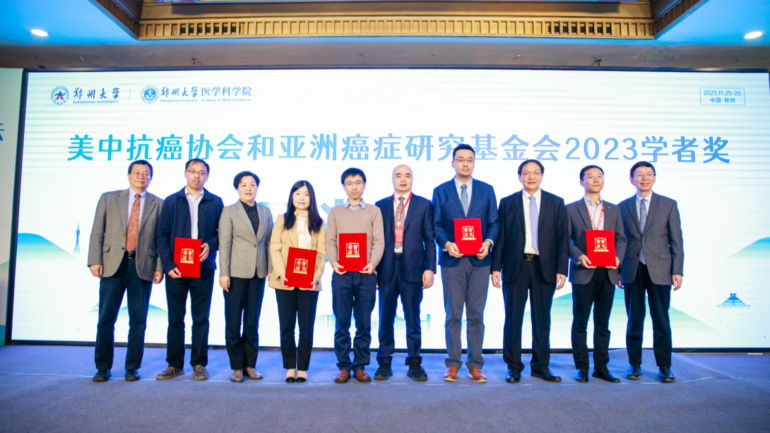THE CHALLENGE
—Unmet Medical Need for Effective Cancer Treatment
Cancer is the second leading cause of death worldwide, with 18 million new cases in 2018 and 9.6 million deaths. Breast cancer is the leading cause of cancer mortality among women, while lung cancer leads for men. In 2018 in Asia, lung cancer is estimated to be the leading cause of cancer death for men and women. Death due to breast cancer in Asian women is only slightly behind lung cancer.
Recent breakthroughs in reactivating the tumor immune response via check-point blockade inhibitors, for example, have led to dramatic long-term responses for some cancer types, but immunotherapies are still not effective for most advanced cancers. A key reason is that tumor cells can overexpress and release a multitude of signaling molecules that reshape the behavior of immune cells in the tumor microenvironment. Thus, advanced cancers typically suppress the immune response by multiple mechanisms.
A different approach is needed to treat and save the lives of patients with advanced cancers.
THE ANSWER
—Multi-functional Antibody Platform to Target the Tumor Microenvironment
AFCR is supporting an innovative platform that develops multi-functional antibody therapies. These new therapeutics have the potential to very significantly expand the horizon for immunotherapies in advanced cancer by providing a more refined control of the tumor immune response. Multi-functional antibodies are single antibody molecules that perform several functions in a synergistic manner, such as:
- Tumor targeting while activating T-cells of the immune system
- Tumor targeting while blocking immunosuppressive modulators of immune system (known as cytokines)
- Simultaneously blocking tumor growth receptors and tumor immune-resistance receptors while activating specific pro-immune cells of the immune system such as Natural Killer cells
In the platform, one bi-functional antibody targets immunosuppressive receptors PDL1 (overexpressed by certain tumors) and CTLA4 (overexpressed by immune regulatory cells), with a unique mode of action. It shows efficacy in non-small cell lung cancer tumor xenograft models and favourable pharmacokinetics in animals.
Other multi-functional antibodies target PDL1 as well as different innovative cytokines that are linked to resistance by preventing immune reactivation. They show efficacy in triple-negative breast cancer and non-small cell lung cancer tumor xenograft models. They are currently undergoing additional efficacy testing against diverse tumor types.
By being more targeted towards the tumor and its microenvironment, these antibodies could also lower systemic side-effects. By carefully engineering multi-functional antibody therapies, there is the potential for more effective cancer treatment.
Unique and Efficient Approach
Making multi-functional antibodies, however, is challenging and currently requires a very comprehensive protein engineering effort. This leads to few multi-functional antibody therapies being tested in preclinical studies, which then endure long development cycles before new therapies reach patients. AFCR is supporting an innovative platform that uses a modular and combinatorial approach to make multi-functional antibodies, where pre-made building blocks—each targeting a key protein in the tumor and its microenvironment—can be readily connected to generate multi-functional antibodies.
Using this unique approach, hundreds of prototype multi-functional antibodies can be generated in parallel and tested pre-clinically. This allows for the rapid identification of optimal therapeutic candidates with improved immunostimulatory properties while minimizing risks in the subsequent clinical trials.
Additionally, by simultaneously testing many alternative multi-functional antibodies, a knowledge database is generated with new insights on the interplay between different mechanisms involved in the reshaping of the tumor immune response. This can drive the discovery of further improved multi-functional antibody therapies.
THE IMPACT
——Improved Immunotherapy for Advanced Cancers
Immunotherapy is lifesaving for only some cancer types and patients with many types of advanced disease are in dire need of life-saving treatment. Advanced cancers typically suppress the immune response by multiple mechanisms. This innovative platform efficiently develops single antibody molecules that will perform several functions in a synergistic manner and have great potential to target the tumor and its microenvironment in advanced cancer.
A Clinical Development Plan
The goal of the multi-functional antibody platform is to bring at least one of the therapeutic candidates towards Investigative New Drug (IND) status and into Phase I clinical trials—to establish the safest dose in patients. Other candidate multi-functional antibodies will continue their pre-clinical development. These IND-enabling studies (process development, large-animal toxicology and Good Manufacturing Practice or GMP manufacturing) have been planned. AFCR’s support, in partnership with public and private medical institutions, could help accelerate the clinical development of these candidates, to bring therapeutic benefits to patients that urgently need them.
HOW YOU CAN HELP
—You Can Bring Hope of Life-Saving Cancer Care
Your support of AFCR will enable scientists and the research community to make paradigm-changing approaches to cancer diagnostics, treatment and even prevention. When you support AFCR, you’re funding a vision: saving lives and eliminating the global burden of cancer. Please consider making a gift today!



